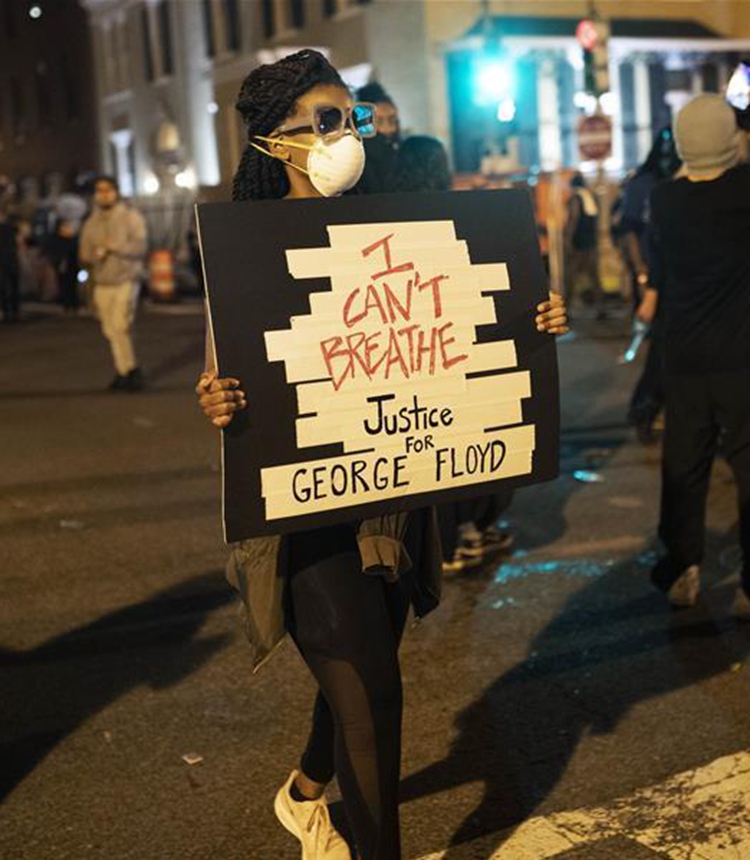George Floyd murder exposes rotten racism in the US
By Wang Wenwen Source:Global Times Published: 2020/6/1 11:44:34

Protesters rally near the White House during a protest over the death of George Floyd in Washington D.C., the United States, on May 30, 2020. Demonstrations and riots have spread to cities across the United States after a video went viral of George Floyd being suffocated to death by a white police officer in the midwest U.S. state of Minnesota on May 25. (Xinhua/Liu Jie)
The line "All men are created equal" articulated in the US Declaration of Independence is difficult to picture as a reality in the US.
The overt lack of respect for the black community who deserve to be treated with the dignity finally led to the death of George Floyd.
Floyd, a 46-year-old black man, died last week after being pinned down by a Minneapolis police officer who held his knee on Floyd's neck for nearly nine minutes. On the video captured of the incident, Floyd pleads, "I can't breathe."
His death ignited long-simmering anger over racism with national eruption of demonstrators hitting the streets. Protests extended from Minneapolis to dozens of American cities.
Why didn't the death toll of more than 100,000 from the coronavirus pandemic send shockwaves? Why was it the killing of a single black man that triggered such sweeping protests?
While viruses doe not differentiate people (regardless of their rank, race and age), racism does. Despite that the US is dubbed as a "melting pot," disparities exist among different races in the country. Although racial equality is guaranteed in law, from the social level and from people's mindsets, potential racial conflicts are brewing.
Long-standing disparities in health and inequalities in access to medical care have also become prominent divisions during the coronavirus pandemic in the US. According to data released by several states and big cities, African Americans are more likely to die from COVID-19, prompting US media to lament, "When white America catches the novel coronavirus, black Americans die." Job losses also tend to be higher among people of color during the pandemic.
Months of concerns for unemployment and individual freedom under lockdown and worries for the future, added with the long-standing racial discrimination, led to this bomb's fuse lighting — and the explosion into violent protests.
The death of Floyd is just the latest in a line of similar incidents in the US in recent years, many of which have led to mass protests. The slogan "black lives matter" reflects the fixated tension between black people and white police.
In 2017, a study of all interactions between US police officers and citizens via body camera footage shows that officers speak with consistently less respect toward black people than the white community.
In 2016, two black men were shot dead by police, leading to protests against the police killings. The protests ended with one man firing upon a group of police officers, killing five of them and injuring nine others. The killer, who was black, said he was upset about police shootings and wanted to kill white people, especially white officers.
Nonetheless, the incident did not evolve into large-scale violent protests, thanks to then president Barack Obama's response. He condemned the shootings and sought justice into police practices. After the two black men were killed, he also argued that African Americans are more likely to suffer at the hands of law enforcement and said Americans should feel outraged at episodes of police brutality, a move that tried to ease racial tensions.
By striking contrast, Obama's successor Donald Trump has done nothing in this regard. President Trump acknowledged African Americans are disproportionately getting sick and dying of COVID-19, but he made no apparent efforts to tackle the exacerbating racial disparities. This is in line with his habitual "speaking loud but acting little."
In response to the death of Floyd and the protests, he tweeted, "when the looting starts, the shooting starts." The implication drew widespread backlash because of its reference to police brutality and violent racism in the 1960s.
In a year of elections that are particularly important for Trump, votes from the black community do not matter that much. After all, Trump won just 8 percent of African American voters four years ago. Black voters are always the base of the Democratic Party. So as protests escalate across the country, Trump played the same old political games by shaming Minneapolis' Democrat mayor and retweeting an account urging Minnesotans to vote Democrats out of office. As the pandemic gets severe, the economic card doesn't work anymore for Trump. Passing the buck is his trump card.
In 2016, Trump won the popular support from the low- and middle-class white people who felt they were reversely discriminated under the Obama era. Trump himself is a racist president, as Democrats call him. The latest protests may just lead to ever stronger white supremacy.
The article was compiled by Global Times reporter Wang Wenwen based on an interview with Wei Zongyou, a professor at the Center for American Studies, Fudan University. Wangwenwen@globaltimes.com.cn
Posted in: VIEWPOINT,OPINION,T7